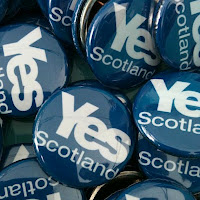The Telegraph today reports that the BBC has described as "ridiculous" and "bizarre" Fiona Hyslop's complaint on Sunday Politics that the Corporation misrepresented the views of Ireland's Minister for European Affairs, Lucinda Creighton. On the programme, Ms. Creighton was shown, again, saying the words attributed to her, as if the complaint was that she hadn't said them. That's not the complaint. You do not need to make something up in order to misrepresent someone's views. You just don't report the important bits. The bits you don't like. Or you miss out any qualifications to what you do report.
And that is just what Ms. Creighton herself says was done. She has written to Nicola Sturgeon to say that she is "concerned that an interview which I conducted with the BBC is being misconstrued" and "sincerely regret[s]" that her comments "seem to have been...presented out of context".
Now, I can imagine a politician attacking an opponent for making a complaint about something and, in support, quoting selectively from something someone else said. That's what politicians do. But the point is that a broadcaster like the BBC should pick up on such selective quotation and misrepresentation, point it out and challenge it, not parrot it and certainly - certainly - not instigate it. Surely the accuracy and partiality of the BBC falls to be judged by a higher standard than we apply to, say, Ian Davidson. And surely we are, all of us, entitled to demand that the BBC meets a standard of reporting that is higher than the mere avoidance of demonstrable factual inaccuracy. So. "Ridiculous"? "Bizarre"? When the actual interviewee herself is also saying her views were "misconstrued"?
The full text of the letter is:
"Dear Nicola,
I want to thank you for a brief but informative meeting yesterday. I am concerned that an interview which I conducted with the BBC is being misconstrued and wanted to assure you that it certainly was not my intention to interfere in any way with your domestic debate.
It certainly was not my intention to intervene in the Scottish debate about the future of your country. As I stated clearly to the BBC (though perhaps they did not show it) this is a question exclusively for the Scottish people and I fully respect that fact.
I was asked about the future of negotiations with the EU in the event that Scotland votes for independence. I thought that my reply was largely in line with that of the Scottish Government. I certainly did not at any stage suggest that Scotland could, should or would be thrown out of the EU. Scottish people are clearly citizens of Europe.
I did answer the question about hypothetical negotiations with the EU. I think it is clear that a newly independent state would have to (and would have the right to and indeed should) negotiate the terms of membership, as they would undoubtedly be somewhat different to the existing terms. I did say that this would take some time, which I expect it would. I also went on to say that a newly independent Scotland would be welcome as an EU partner (and I think that applies to all EU member states including Ireland).
My understanding is that the Scottish Government has already committed to a negotiation with the EU between 2014 and 2016, if you vote for independence in 2014. If my interview suggested something other than that, this was not my intention. I think my comments have been misconstrued. I sincerely regret this.
As SNP Westminster Leader, Angus Robertson said ‘Negotiations on the terms of membership would take place in the period between the referendum and the planned date of independence’, and that ‘The EU would adopt a simplified procedure for the negotiations, not the traditional procedure followed for the accession of non-member countries’.”
I think that sums up the situation quite well.
I hope that this clarifies my position, and again I regret that my words seem to have been presented or taken out of context.
Warm regards,
Lucinda Creighton"
So these are her views, clearly and definitively expressed. Maybe the BBC and the Telegraph will report them with as much prominence as the earlier inaccurate extracts. Maybe. Just in case, the text of the letter is here.

No comments:
Post a Comment